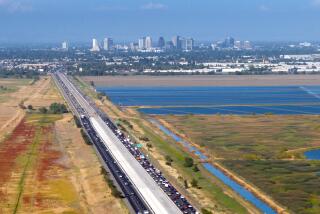California Sees Mineta as an Ally
WASHINGTON — California transportation planners are looking to incoming Transportation Secretary Norman Y. Mineta for help in getting people out of their cars and onto trains and buses to ease freeway congestion.
As a senior member and chairman of the House Transportation Committee, the former Democratic congressman from San Jose was known as an advocate of mass transit.
But, while mass transit is a cornerstone of Democratic Gov. Gray Davis’ transportation policy, it generally has been a low priority for GOP administrations in Washington. Transit projects are costly and they tend to generate union jobs that can translate into campaign contributions for Democrats.
Politically, Mineta faces a major test of his skills as a coalition-builder in trying to help his home state. On a policy level, he may need to develop a new rationale for transit, linking it to tangible benefits for businesses that depend on the mobility of their employees and their goods.
“I would think the selection of Mineta suggests an openness on the part of the administration to looking at all types of transportation, including transit,” said Caltrans Director Jeff Morales, who as a U.S. Senate aide in the 1980s worked with Mineta.
Mineta also could have a role in the debate over Southern California’s crowded skies. A decision by the Federal Aviation Administration on whether the former Marine Corps air field at El Toro can be safely used as a commercial airport may well come on his watch.
A spokeswoman for the George W. Bush transition team said that Mineta is not granting interviews before his confirmation hearings. Transportation policy was not a major issue in the election, and the new administration’s priorities may emerge slowly.
Californians spend 418,000 hours a day stuck in traffic, according to a study conducted last May for the state Legislature. The amount of driving done by state residents grew by 30% from 1988 to 1998, while freeway capacity increased by just 1%.
“Traditionally, the motorist has been the center of attention in California, but we believe that we need to develop a stronger rail alternative,” said Maria Contreras-Sweet, Davis’ secretary of business, transportation and housing. “We understand that Mr. Mineta is very much a supporter of rail, and we think he will be supportive.”
Rod Diridon, executive director of the Mineta Transportation Institute at San Jose State University, named for the former congressman, said that the secretary-designate supported many major California projects during his nearly 21 years on Capitol Hill. Among them were several extensions of the Bay Area Rapid Transit system and light rail lines in San Jose and Sacramento.
However, Diridon said that Mineta is not dogmatic in his advocacy of mass transit.
“His interest in transit is in addition to his interest in autos,” said Diridon. “He believes you have to use all the tools to move people and goods, and that doesn’t mean downgrading cars and highways. Mass transportation is an element of an intelligent transportation system, but it has to be used judiciously. You can’t go out and build subway tunnels in Wyoming.”
California received about $3.3 billion in federal transportation money last year, while the state spent $4.5 billion and local governments and transit districts contributed $7.5 billion.
In the short run, Caltrans’ Morales said that California will be seeking federal funding to aid in completing an extension of the Bay Area Rapid Transit system to San Jose. State and local taxpayers already have put up about $3 billion, he said, and the state wants $1 billion from Washington.
In the long run, transportation planners envision a high-speed rail link from San Diego to San Francisco, with sleek trains that can travel at speeds exceeding 180 mph.
“One of the problems we have had in Congress is that there is a tendency to want to look at the 50 states as equals,” said Morales. “Obviously, California is not just one of 50, and having a secretary who understands that will assure that we at least get a fair hearing.”
In Los Angeles, Metropolitan Transportation Authority chief executive Julian Burke said that his agency is seeking payment of subway funds already pledged by Congress and support for a major program to replace aging buses that are prone to breakdowns.
The MTA will also require money for four “fixed guideway systems”--special busways or light rail lines--that are under development.
“I believe it’s terrific for us to have a Californian there because Los Angeles has great needs, both in terms of transit and highways, and we are always seeking further financial support,” Burke said.
More to Read
Sign up for Essential California
The most important California stories and recommendations in your inbox every morning.
You may occasionally receive promotional content from the Los Angeles Times.










